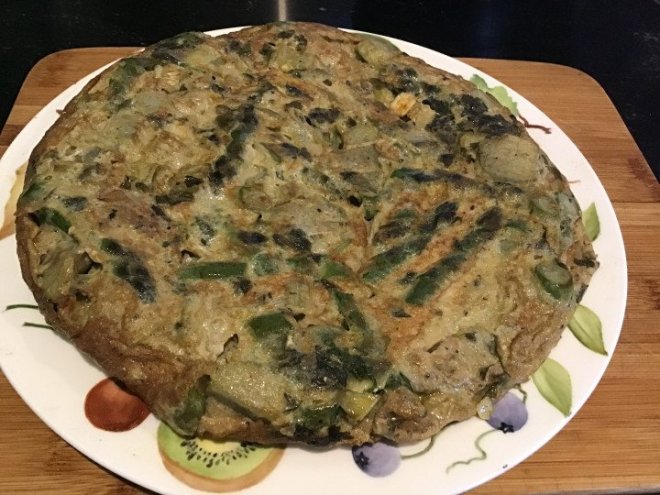Melbourne residents who have been in COVID lockdowns are now able to catch up under limited circumstances with friends.
Restrictions have been lifted:
Social gatherings are permitted outdoors between two people from a maximum of two households. Up to five people can socialise outdoors (excluding dependants), from two households, if every person over 18 years is fully vaccinated.
So that is what 4 of us did!
It is spring, and although the weather has been unpredictable it was a sunny day.
We ate well. The two households shared different things – Vitello Tonnato, Fior Di Latte (fresh mozzarella), Jamón. fennel withTapenade, home baked bread, a green salad (nasturtium leaves, herbs, frisée lettuce and other green leaves) and a frittata with artichokes and asparagus.

I often make frittata for various occasions. Frittate (plural) are easy and laudable for all occasions – passed around at a celebration, breakfast, lunch , starter or dinner: they are extremely portable, excellent as a filling between bread or a picnic A frittata can be eaten hot, warm or cold. You can begin with raw or cooked ingredients and frittate are ideal for using cooked leftovers. I prefer frittate made of vegetables, but adding cooked meat or fish, smallgoods, cheese, cooked pasta or potatoes will make them more substantial.
On this occasion I wanted to celebrate spring produce and I used asparagus and artichokes.
I could have added other spring vegetables: new peas, broad beans, green beans, snow peas, zucchini and their flowers, but I did not. I kept it simple.
It is very common to add a little grated parmesan to a vegetable frittata, but one friend is allergic to diary produce so I did not use any on this occasion. This frittata minus a little cheese did not suffer and if anything, the individual tastes of the two vegetables was more distinct.
I sautéed my vegetables and cooked them separately. This makes the frittata tastier. The cooked, cooled ingredients are then added to the beaten eggs.

Ingredients: 8 eggs. 600g asparagus, 2 spring onions sliced thinly, 2 young artichokes, chopped parsley, salt and pepper, 1 clove of chopped garlic, extra virgin olive oil, white wine and a little stock. A bowl with water and the juice of 1-2 lemon is necessary to immerse the artichokes as you work to prevent the artichokes from discolouring.
Use the same frypan to sauté the vegetables and the frittata.
The artichokes will take the longest to prepare. For the artichokes:
Remove the stems, strip off the rough fibrous outer and immerse them to a bowl with water and lemon.
Remove the tough outer leaves until you reach the softer and paler heart of the artichokes. cut the tip off each of the artichokes (on the tip of each leaf there is a thorn). Some types of artichokes can have large thorns!

Cut the artichokes in half and remove the internal beard with the help of a knife or a spoon, (looks like fluff). Cut the artichokes into thin slices and immerse them in water and lemon.
Drain the artichokes well when you are ready to cook them.
Heat some extra virgin olive oil, add garlic and as soon as the garlic begins to fry, add the artichokes and sauté on high heat.
Add a splash of white wine and evaporate. Add the parsley and a splash of stock (or water), cover with a lid and allow to cook. Set aside to cool.



Asparagus come in various shapes, colours and sizes.
For the asparagus:
Remove the woody part of the stem and cut the bottom part of the asparagus into slices. Cut the top part into larger pieces – the top half of the asparagus is generally more tender. Sauté the spring onions in a little extra virgin olive oil, add the asparagus, a pinch of salt, toss them about in the hot pan, add 1-2 tablespoons of water and cook for a couple of minutes. Leave the asparagus slightly crunchy and set aside.

Place the eggs into a large bowl, add a pinch of salt and freshly ground pepper. Beat vigorously with a fork until the egg mixture is homogeneous.
Add the cooked artichokes and asparagus to the eggs and mix well.

Heat some extra virgin olive oil in the same frypan and when the oil is hot, pour the mixture into the frypan and cook over medium heat.

Use the spatula to press the frittata and to lift the edges so as to encourage even cooking.
Turn the frittata when it is ready to flip.

**For more detailed instructions and photos of how to handle cooking and flipping a frittata see:
ALL ABOUT MAKING FRITTATA and Podcast with Maria Liberati
I wrapped my frittata in some foil and then a tea towel . we did not travel far and we ate it warm. You can also transport it in the frypan. covered with foil.

Other Recipes for Frittate:
ASPARAGI DI BOSCO and FRITTATINA (Wild Asparagus continued, and Frittata)
Artichokes, general:
Artichokes recipes. There are many. Use the search button and type in artichokes.







 I have written many recipes for artichokes on my blog… Use the search button and type in ‘artichokes’ if you wish to find how to clean artichokes and recipes.
I have written many recipes for artichokes on my blog… Use the search button and type in ‘artichokes’ if you wish to find how to clean artichokes and recipes.




